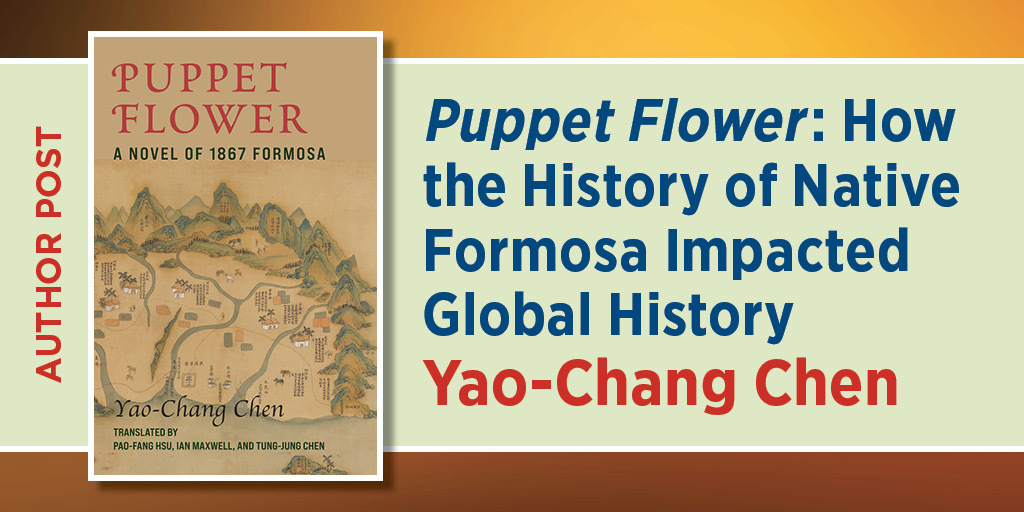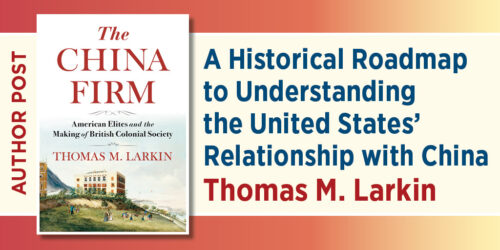Puppet Flower: How the History of Native Formosa Impacted Global History
Yao-Chang Chen

I was born and raised in Tainan, Taiwan. My ancestors came to Taiwan in 1661, with Ming-dynasty general Koxinga (aka Zheng Chenggong), who led his army to defeat the Dutch and seized Zeelandia (now Tainan).
Many readers may know Taiwan is a “silicon island” because of its vital role in the semiconductor industry. Yet, in the age of Great Discovery, Taiwan was known as “Ilha Formosa,” meaning “beautiful island.” On the island were native Formosans who formed their own tribes with distinct languages, cultures, and autonomous governance.
Due to its geographic location and its valuable products, such as tea, camphor, sugar, and minerals, Formosa (or Taiwan) attracted many traders and voyagers to the island, bringing with them diverse cultures.
Since my youth, I have been intrigued by the multicultural facets of Taiwan’s history. After retiring from my medical profession, I have devoted myself to writing stories about Taiwan. My first historical novel—A Tale of Three Tribes in Dutch Formosa–is set against the backdrop of Formosa under Dutch rule. The narrative recounts legendary stories related to my ancestors’ migration to Taiwan.
Then I came to realize that a sizable number of native Formosans had been living on the island but sadly their tragic history was little known. With this realization, I started to review historical documents and to discover stories related to Formosan indigenous peoples.
Because of the lack of written languages, Taiwan’s indigenous peoples have left few historical documents, and, even when they exist, they were mostly written from outsiders’ perspectives. Thus I tried my best to interpret: I reviewed available written documents, went to the places where the event occurred to trace the event route, talked to the locals to learn what they knew or what their perspectives were. I also discovered that new social media such as Facebook is a good resource to get clues about something I am interested in. Normally I would post questions on it and very often, magically, I would receive prompt responses or feedbacks. My Facebook friends also directed me to another person whom I might interview to get the information.
Since my youth, I have been intrigued by the multicultural facets of Taiwan’s history.
The book Puppet Flower is the first novel in my Chinese-language “Flower” trilogy, which was conceived to tell stories about the intertwined fate among native Formosans, foreign voyagers/sojourners, and Han Chinese immigrants. The story originated in the Rover incident, which occurred in Kenting in the southern tip of Taiwan, which is at the junction of the Taiwan Strait and the Bashi Channels of the Luzon Strait. In the nineteenth century, it was the main shipping route, with many tragic shipwrecks.
On March 12, 1867, an American merchant ship, the Rover was wrecked and drifted to a coast near Kenting. The sailors on board, including the captain and his wife, were killed by the native Formosans from the area. As a result, Rear Admiral Henry H. Bell, commander of the United States Asiatic Squadron, sent a troop of 181 officers, sailors, and marines to land on a beach in Kenting. This military mission, however, was not successful in finding people who were responsible for the killing. The troop was ambushed by the native Formosans, and the marines withdrew from the island. This action was reported as the American Expedition to Formosa.
Consequently, a diplomatic action was taken and resulted in the signing of the South Cape Agreement.
Because of the lack of written languages, Taiwan’s indigenous peoples have left few historical documents, and, even when they exist, they were mostly written from outsiders’ perspectives.
The male protagonist of this book was a U.S. consul to Amoy, Charles W. Le Gendre. I think that he, a legendary figure, had an interesting life and storied career. He might not have a very high-ranking position in diplomatic circle, but his impact on the history of East Asia (Taiwan, China, Japan, Korea) is probably greater than that of any U.S. president in the nineteenth century. As a U.S. consul, he visited Taiwan several times between 1867 and 1872. He wrote Notes of Travel in Formosa, from which I learned a great deal about Taiwan history that has not been recorded in Chinese-language documents.
Le Gendre was born in 1830 as a French national. He married the daughter of a prominent New York lawyer and became a naturalized U.S. citizen. He joined the Union army during the American Civil War. He lost his right eye fighting the Confederate army. His army superior, General Grant, who later became president of the United States, sent him to Amoy to serve as consul, ostensibly an easy job. When the Rover incident occurred, Le Gendre traveled to Taiwan several times to understand the situation. Later he came to realize the island’s unique status and became an expert on Formosa and East Asia.
The Rover incident drew international attention to the safety of voyagers in the region. Le Gendre chose to work with the leader of the Seqalu chiefdom Tauketok, resulting in an agreement between the eighteen tribes of the Lower Liangkiau and the United States. The first agreement was an oral one, reached on October 10, 1867.
He might not have a very high-ranking position in diplomatic circle, but his impact on the history of East Asia (Taiwan, China, Japan, Korea) is probably greater than that of any U.S. president in the nineteenth century.
Puppet Flower is about the story leading to the oral agreement. The parties later signed a written agreement. (Curious readers may find the content of the South Cape Agreement in the 1869 annual report of the U.S. Department of State or in my preface to this novel.) This is perhaps the first written agreement between Taiwan and foreign countries. The signatory was tribal chief Tauketok instead of an official of the Qing Empire.
Le Gendre’s important deeds were yet to come. In 1871, a ship from Ryukyu (now Okinawa, Japan) with sixty-six sailors on board was wrecked along the coast of Seqalu territory. Fifty-four of them were later murdered by the natives of the Botan (Mudan) tribe, in violation of the South Cape Agreement. Le Gendre was greatly disappointed with the native Formosans. He lost his trust in Formosan aboriginals in protecting the shipwrecked victims.
At the end of 1872, Le Gendre completed his full tenure as a consul at Amoy, but his appointment as an ambassador to Argentina did not get approved by the U.S. Congress. Thus on his way back to the U.S., he decided to disembark in Yokohama. He later became an adviser to the Ministry of Foreign Affairs of Japan. In 1873, he wrote an important report, “Is Aboriginal Formosa a Part of the Chinese Empire?” His argument was no. This claim served as grounds for Japan to invade Taiwan and attack the Botan tribe.
In 1874 Japan sent troops in a punitive expedition to southern Formosa. The Japanese troops defeated the Botan tribe. This expedition resulted in twelve Japanese casualties during the fights, but nearly six hundred soldiers got sick and died. The Japanese troops had no choice but to withdraw from the island. This time Japan did not coordinate with the native Formosans but turned to the Qing Empire. Japan and China signed a bilateral convention in Peking on October 31, 1874. From then on, the self-governed Formosan tribes became legally governed territories of the Qing Empire. The Qing emperor initiated the policy of “cultivation of barbarians” in the island. This was the start of decades’ oppression of and discrimination against Taiwan’s indigenous peoples.
On the other hand, the Ryukyu kingdom consequently became a part of Japan in 1879.Then, in 1895, Japan finally occupied Taiwan after defeating the Qing Empire in Korea. All these historical events could be regarded as the “butterfly effects “of the Rover incident, in which Le Gendre played an important role.
Yao-Chang Chen is professor emeritus of medicine at National Taiwan University and a leading specialist in blood cell diseases. He is the author of Puppet Flower: A Novel of 1867 Formosa.





